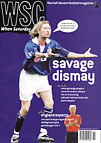 In the aftermath of the world trade centre attacks, Charles Armitage explains how social issues and football are very much interlinked
In the aftermath of the world trade centre attacks, Charles Armitage explains how social issues and football are very much interlinked
The recent atrocities in the US have thrown the spotlight on the changing way in which football is regarded as a public event. Football was once a diversion from “real life”. Now it seems to be taking on the role of representing real life. Society, the media and the game itself may even be on the way to according it a quasi-religious role.
The minute’s silence before a match becomes more common, it seems, by the year. The deaths of Fifties’ wing halves, directors’ wives and TV commentators have all been marked in this way recently. One in every ten games, it seems, opens with the bowed circle in the middle of the quiet stadium, a silence customarily ended with that incongruous, full-throated roar. The half a million people who gather at games each weekend are becoming a form of church, a vehicle for society (rather than just for football itself), to pay communal respects and, in the most extreme cases, to show it cares by abstaining altogether. The emotional load on the game grows.
On the day of the US disaster the football programme, internationally and domestically, continued as planned. The Vatican reportedly attacked UEFA for the decision to play. The coach of PSV, who lost 4-1 to Nantes, demanded a replay as his players were not in the right frame of mind to play. Unlike Nantes? Unlike thousands of firefighters and pilots across Europe who all worked as usual but with dread in their minds? Perhaps the mental focus that modern football demands truly is subject to stress like no other profession.
The football authorities were faced with complex decisions in this crisis. It is impossible to put values (moral, prudential, financial) on the factors that make up the decision to play or not. The easier decision, for all the disruption it causes, is to call off the matches – which UEFA did for the rest of the week. This was a decision few cared to criticise, one that placed international football in solidarity with the earth-stopping tone of the public discourse.
Other international events like London Fashion Week and the Italian grand prix went on as planned, and to muted criticism, as did domestic football. The European game shouldered the burden of abstinence as New Yorkers fought to get back to normal, to let the terror affect their way of life as little as possible.
Was more or less achieved by these postponements than by a minute’s silence? If, for instance, you were a Hibernian fan already in Greece on a few days holiday built around the game against AEK, would you feel any less diminished by terrorism if the game had gone ahead? And could you dare say so?
These decisions are not left to fans themselves. In theory, it could be left up to the fans to choose whether to attend the match. Anyone who felt the circumstances were not right would not have to go. In practice, almost all fans would watch a game whatever the circumstances (even immediately after the Heysel disaster) and the football authorities recognise this. The fans are not seen as capable of offering their own lead. They must be guided, just as they are increasingly controlled by individual seating and dominating loudspeaker systems inside modern stadiums.
The decisions are with the authorities, as ever before, and these decisions set the tone for the way in which football is seen by the rest of society. Such decisions can have far-reaching effects. English football completed the 1914-15 season during the First World War and was vilified by the patriotic lobby for years after. When the Second World War broke out the League programme was, therefore, immediately suspended for the duration. But the need for football as a diversion from the war was strong too. Within a fortnight there were friendlies and within six weeks robust regional competitions were organised. When George VI died in 1952 there was a full League programme only three days later. When the Queen dies we will see how much football’s place in the order of things has changed.
Football continues to speak in religious tones. Grounds have always been “shrines” and the ashes of the faithful have been scattered on the pitches. This was all once private observance. Now, more publicly, there are floral tributes at the stadium, statues of the great outside and marriage ceremonies taking place inside. Has professional football become our society’s central mode of celebration? Are our stadiums now the physical site of the national and European psyche? It is truly something that would not have been thought possible at the time of Heysel in 1985.
From WSC 177 November 2001. What was happening this month